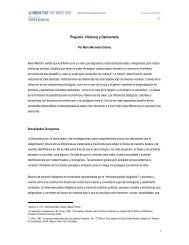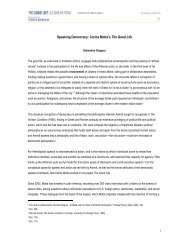Carlos Motta - La buena vida
Carlos Motta - La buena vida
Carlos Motta - La buena vida
You also want an ePaper? Increase the reach of your titles
YUMPU automatically turns print PDFs into web optimized ePapers that Google loves.
118<br />
119<br />
youngest ones, the presumably consolidated and<br />
the very fragile ones.<br />
However, this relative retraction of the<br />
democratizing dynamics has not entailed<br />
the end of the impulses in favor of greater<br />
democratization. New practices in the<br />
articulation of international civil society and new<br />
ways of amalgamating the efforts of emerging<br />
countries reflect a movement that strives for<br />
more and better democracy. These democratizing<br />
claims may—as has occurred in other historical<br />
moments—be channeled or constrained. The<br />
spaces to advance along these lines seem to be<br />
narrower than they were at the beginning of the<br />
Post-Cold War period, and the viability of their<br />
materialization seems to demand prudence and<br />
creativity. The democratizing flame has extended<br />
to the whole planet, but its full and profound<br />
expression confronts today great obstacles and<br />
a considerable number of enemies. Instead of a<br />
new 'coalition of the willing' organized to attack<br />
another country in the periphery, there is a need<br />
of a 'coalition of the vulnerable' between peoples<br />
in both the central nations and the peripheral<br />
areas: this is, in all of its dramatic dimension, the<br />
scope of the current challenge for democracy to<br />
survive and extend.<br />
Juan Gabriel Tokatlián is a professor of<br />
International Relations at the Universidad de San<br />
Andrés in Buenos Aires, Argentina.<br />
tricks of logic<br />
and constellations<br />
of time<br />
ashley hunt<br />
What follows will be filled with tricks. Not to be<br />
tricky per se, nor excessively clever, but to think<br />
about tricks of thought, as they might lead us<br />
into traps, or as they might help us think our way<br />
out of them.<br />
For example, I believe it is something of a<br />
trick that assumes the prison to be an institution<br />
“belonging to” democracy. It is not uncommon<br />
to come across this coupling, since we know<br />
prisons developed into their modern form<br />
in a time frame parallel to the emergence of<br />
modern democratic states. But the trick here<br />
lies in confusing democracy (a mode of rule<br />
and its contestation) for the state (institutions,<br />
documents and infrastructures of rule). States<br />
may conform to a liberal- or social-democratic<br />
model, or may be organized in a manner more<br />
or less conducive to supporting democracy, but<br />
a state cannot, in and of itself, be democracy,<br />
let alone desire it. The state institutes an<br />
ordering and distribution of power, structures<br />
of hierarchy and thresholds of inclusion and<br />
exclusion; whereas democracy is the pursuit to<br />
alter the fixity of that state of affairs. The prison<br />
is but one apparatus at the state’s disposal for<br />
maintaining and naturalizing that state of affairs,<br />
and thus contradicts the very logic of democratic<br />
progression — having more to do with managing<br />
the effects of failures and deficiencies of<br />
democracy and concealing its calculated<br />
subversion. 1<br />
A trick in the other direction: Let’s say you go<br />
to prison. If this takes place within the United<br />
States, you will be banned from voting — unless<br />
you live in Maine or Vermont, the two states<br />
which do allow prisoners to vote. Once released<br />
from prison and designated an “ex-felon,” you will<br />
remain banned from voting while on probation<br />
or parole in at least 38 states, and in 13 of those<br />
states, you will be banned for the rest of your<br />
natural life. 2<br />
Had your status as an ex-felon been assigned<br />
in Florida, then in the 2000 presidential election<br />
you would have experienced a confluence<br />
between political policy and political history. The<br />
state kept 600,000 ex-felons from participating<br />
in the election, along with another 200,000 who<br />
were held in prisons, the majority of whom, if<br />
1 Here I am relying in part upon Jacques Rancière’s<br />
notion of democracy as argued in his “10 Theses on<br />
Politics”: “The ‘freedom’ of a people that constitutes<br />
the axiom of democracy has as its real content the<br />
rupture of the axioms of domination... Democracy is<br />
the institution of politics — the institution of both its<br />
subject and its mode of relating.”<br />
2 See http://www.sentencingproject.org/RightTo<br />
Vote.aspx<br />
allowed to vote, would most likely have voted<br />
for Al Gore and could have swung the election<br />
decisively. 3<br />
As you experienced this intersection<br />
between political policy and a future to come,<br />
you would simultaneously have experienced a<br />
link with a past: with the period following the<br />
1870 ratification of the 15th Amendment to the<br />
United States’ Constitution, which states, “The<br />
right of citizens of the United States to vote<br />
shall not be denied or abridged by the United<br />
States or by any State on account of race, color,<br />
or previous condition of servitude.” Within<br />
years of this “democratization” of voting, 80%<br />
of U.S. states would have “felony” or “criminal<br />
disenfranchisement” laws passed — the very<br />
same which today ban over 5 million citizens<br />
from voting. 4 These medieval laws were adopted,<br />
along with a variety of poll taxes, literacy tests<br />
(and unofficial, white-supremacist terrorism),<br />
specifically to keep newly enfranchised African<br />
Americans from exercising their right to vote.<br />
In other words, following the extension of<br />
universal voting rights to all men5 — which we<br />
can understand as a gesture to redistribute<br />
power by undoing a structure of exclusion — new<br />
laws were appropriated creatively to preserve the<br />
monopoly of political rule and economy that had<br />
already existed, accomplishing the exclusions<br />
necessary to this monopoly but by other logics.<br />
With the previous logic of exclusion having been<br />
biological, the same racial contents would now<br />
express themselves through selective logics<br />
of economic status, culture, lawfulness and<br />
danger. 6<br />
3 See “Democratic Contraction: Political<br />
Consequences of Felon Disenfranchisement in the<br />
United States,” published in the American Sociological<br />
Review, Vol. 67, Dec., 2003.<br />
4 See “Losing the Vote: Felony Disenfranchisement<br />
<strong>La</strong>ws in the United States” (1998), report by The<br />
Sentencing Project and Human Rights Watch.<br />
5 Women were, with few exceptions, still banned from<br />
voting until 1920 and the 19th Amendment.<br />
6 For an excellent analysis of this history, see Clyde<br />
Woods, Development Arrested: The Blues and Plantation<br />
Power in the Mississippi Delta<br />
Following this genealogy of your disenfranchisement<br />
further, jump 90 years into the<br />
future, where these newer strategies of exclusion<br />
would be significantly challenged by the Civil<br />
Rights Acts of 1960 and 1964, and the Voting<br />
Rights Act of 1965. Despite their undoing of a<br />
century worth of new structures of exclusion,<br />
they reaffirmed your coming disenfranchisement<br />
by failing to address the key, post-Jim Crowe<br />
technology of racial control: criminalization.<br />
This trick, criminalization, works well. It is one<br />
of the most effective for rulers to use in dividing<br />
ruled populations against one another so that<br />
they don’t unify against how or by whom they are<br />
being ruled. It is the most simple way to malign<br />
would-be “freedom-fighters” and to disrupt the<br />
continuities of trust that bind organization and<br />
activism. Whether that means turning people<br />
against one another in violence and competition<br />
over scarce resources, or conversely, leaving<br />
people with too much, atomized in comfort and<br />
full of fear towards others, it keeps the fight as<br />
one among individuals, preventing the formation<br />
of collective political identifications and<br />
analyses of power.<br />
In the post-Civil Rights era, criminalization<br />
has become the container of legitimacy<br />
into which so many previous forms of racial<br />
control are concealed. This can be seen in<br />
the 740% growth of the prison system since<br />
1970 with a 75% majority of people of color, as<br />
the prison has all but replaced welfare state<br />
institutions in “managing” the devastation of<br />
Neo-Liberal economics upon working-class<br />
and poor communities. And in this time, just<br />
as this constellation of pasts converged in<br />
your individual disenfranchisement from the<br />
2000 election, there are additional ways that<br />
imprisonment impacts democracy.<br />
For instance, odds are that you would have<br />
come from a community in which many people go<br />
to prison, 7 one plagued by a constant uprooting<br />
and relocation of bodies and minds. This<br />
disrupts the continuity of family life, economic<br />
7 This can be see in the work done by <strong>La</strong>ura Kurgan in<br />
the “Million Dollar Blocks” project, http://www.l00k.org/<br />
milliondollarblocks/million-dollar-blocks




